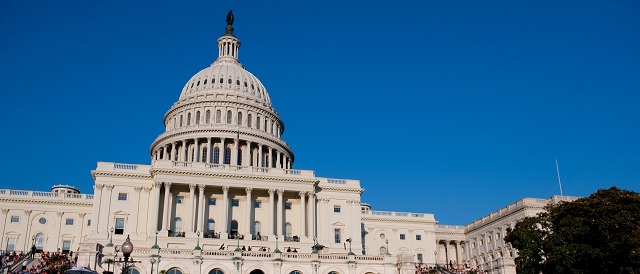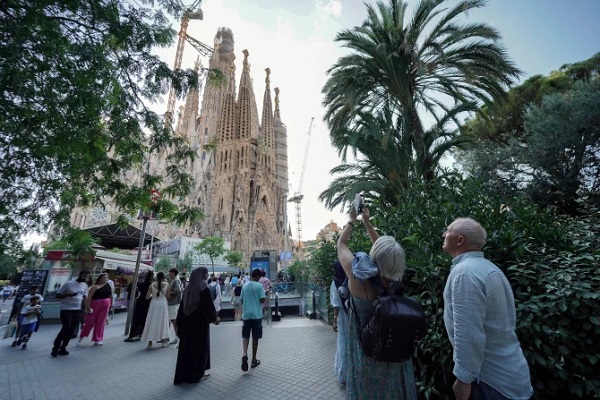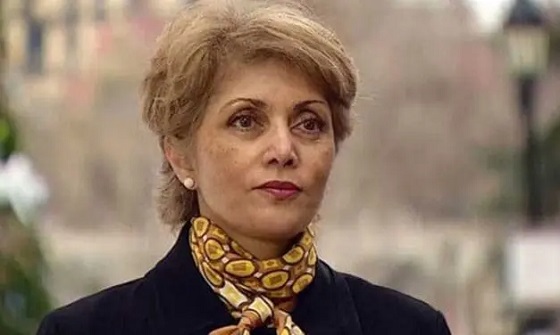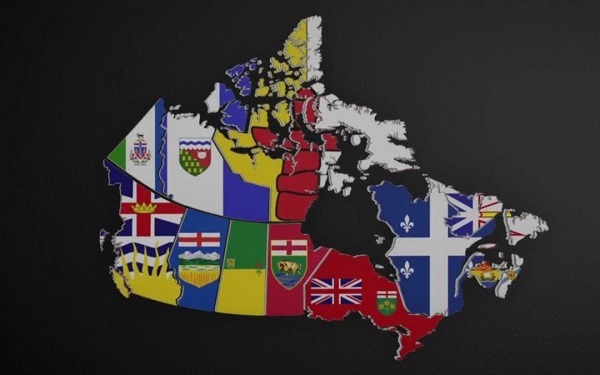International
Can Russian And Chinese Agents Legally Vote In DC?

 From the Daily Caller News Foundation
From the Daily Caller News Foundation
Suppose Russian President Vladimir Putin and Chinese President Xi Jinping made an agreement: All their personnel stationed in Washington, D.C., would vote for the same candidates running in Washington’s local elections.
How many votes would this hypothetical alliance deliver? Perhaps not many — but more than a few.
The New York Times reported last July that the number of Russians working at their D.C. embassy had dropped significantly.
“In recent years, as many as 1,200 Russian personnel worked in the embassy compound,” said the Times. “The State Department will not say how many remain — staffing levels here and at the U.S. Embassy in Moscow are now a sensitive topic — but in January 2022, Mr. [Anatoly] Antonov [the Russian ambassador] put the number at 184 diplomats and support staff members.”
The website of the Chinese Embassy in Washington does not appear to mention how many Chinese nationals are deployed there. But it does talk about the massive size of the embassy building. “It covers an area of 10,796 square meters with a floor area of 39,900 square meters,” it says.
So, how can the Chinese nationals who work there — for a communist government — get away with voting in an American election?
How can Russians, working at the direction of Putin, do the same?
The D.C. government enacted a law that allows it.
On Oct. 18, 2022, the D.C. Council voted 12 to 0 — with one member absent and not voting — to approve the Local Resident Voting Rights Amendment Act. Despite this one-sided vote, Mayor Muriel Bowser did not support it.
“Mayor Bowser expressed opposition by withholding her signature on the Act — something she has done only a handful of times over the course of her tenure,” said a report on the act published by the House Oversight and Accountability Committee.
The Washington Post also opposed it — in an editorial published a day before the Council vote.
“Voting is a foundational right of citizenship,” said the Post. “That’s why we oppose a bill, poised to pass the D.C. Council this week, that would allow an estimated 50,000 noncitizen residents to cast ballots in local elections.”
The Post also pointed out that this bill would allow both illegal aliens and foreign nationals working at foreign embassies to vote in D.C. elections.
“The proposal has been expanded to give voting rights in local elections to all noncitizen adults, regardless of whether they are in the country legally, so long as they’ve resided in the District for 30 days,” said the Post.
“There’s nothing in the measure,” the Post said, “to prevent employees at embassies of governments that are openly hostile to the United States from casting ballots.”
The House committee report repeated these points.
“On November 21, 2022, the District government enacted the Local Resident Voting Rights Amendment Act … which allows noncitizens, including illegal immigrants, to vote in D.C. local elections,” said the report. “The Act makes no exception for foreign diplomats or agents voting in the District. These individuals often have interests separate from, or opposed to, the interests of Americans. This D.C. Act dilutes the votes of American citizens and could have a ripple effect across other large U.S. cities.”
The D.C. Board of Elections has posted online instructions for how foreign nationals can vote in D.C. elections.
“Starting in 2024, qualified non-citizen District of Columbia residents may vote in local elections,” say the instructions.
“Specifically, under District of Columbia law, non-citizen residents may vote in District of Columbia elections held for the offices of Mayor, Attorney General, member(s) of the DC Council, member(s) of the State Board of Education, or Advisory Neighborhood Commissioner(s), or to vote on initiative, referendum, recall, or charter amendment measures that appear on District of Columbia ballots,” say the instructions.
“Non-citizens cannot vote for federal offices,” they warn.
In its editorial opposing the bill, The Washington Post had made a key point about this last provision.
“The U.S. Constitution does not explicitly prohibit what the D.C. bill seeks to do, but a law signed in 1996 by President Bill Clinton bans noncitizens from voting in federal contests,” said the Post. “The proposed law presents logistical nightmares that will require the Board of Elections to print separate ballots so that noncitizens don’t vote in federal races.”
Republican Rep. James Comer of Kentucky introduced a resolution in January 2023 to nullify this D.C. voting law. When it came up for a vote on Feb. 9, 2023, then-House Speaker Kevin McCarthy spoke in support of it.
“Last year, Washington, D.C., passed a law that would give the vote to illegal immigrants,” McCarthy said on the House floor. “The law makes no exceptions for foreign diplomats or agents who have interests that are the opposite of ours. Under this bill, Russian diplomats would get a vote and Chinese diplomats could get a vote.
“The CCP is already infiltrating our culture, our farmland, and our skies,” said McCarthy, “but the D.C. council would let them infiltrate our ballot boxes.”
The resolution to nullify this D.C. law passed the House 260-162 — with 42 Democrats joining 218 Republicans.
But it went nowhere in the Senate.
On May 23, the House again approved a bill to stop noncitizens from voting in D.C. elections. This time the vote was 262 to 143 — with 52 Democrats voting for it.
Yet, this week, our nation’s capital had its first local primary election where Russian and Chinese agents could legally vote.
Terence P. Jeffrey is the investigative editor of the Daily Caller News Foundation. To find out more about Terence P. Jeffrey and read features by other Creators Syndicate writers and cartoonists, visit the Creators Syndicate website at www.creators.com.
International
Nigeria better stop killing Christians — or America’s coming “guns-a-blazing”

President Trump on Saturday warned that the United States military “may very well” launch an armed intervention in Nigeria if the government continues allowing the slaughter of Christians by radical Islamist groups — a stark escalation following his recent designation of the African nation as a “Country of Particular Concern.”
— Rapid Response 47 (@RapidResponse47) November 1, 2025
In a post on Truth Social, Trump directed the Department of War to “prepare for possible action,” warning Nigerian officials that Washington’s patience had run out. “If the Nigerian Government continues to allow the killing of Christians, the U.S.A. will immediately stop all aid and assistance to Nigeria and may very well go into that now disgraced country, guns-a-blazing, to completely wipe out the Islamic terrorists who are committing these horrible atrocities,” Trump wrote. He added that any American strike “will be fast, vicious, and sweet, just like the terrorist thugs attack our cherished Christians.”
The warning follows Trump’s declaration Friday that “Christianity is facing an existential threat in Nigeria,” where thousands have been massacred by Islamist militants. He said the numbers were staggering — citing roughly 3,100 Christian deaths in Nigeria compared with about 4,476 worldwide — and ordered Rep. Riley Moore (R-W.Va.) and House Appropriations Chairman Tom Cole (R-OK) to immediately investigate and report their findings. “Something must be done,” Trump wrote, calling the situation “a mass slaughter” and urging swift action.
Trump’s call to action has drawn praise from prominent voices. Rap mogul Nicki Minaj reposted Trump’s earlier remarks and said his attention to the plight of Nigerian Christians gave her a “deep sense of gratitude.” “We live in a country where we can freely worship God,” she wrote on X. “No group should ever be persecuted for practicing their religion.”
Trump’s increasingly forceful stance on Nigeria marks one of the clearest demonstrations yet of his promise to defend persecuted Christians worldwide — and to use America’s power, if necessary, to make that protection real.
Crime
Public Execution of Anti-Cartel Mayor in Michoacán Prompts U.S. Offer to Intervene Against Cartels

“I don’t want to be just another mayor on the list of those executed”
On the first night of November, during Day of the Dead celebrations, the independent, anti-cartel mayor of Uruapan in Michoacán, Carlos Manzo, was assassinated in the heart of his city during a public festival. His bloody murder has underscored the deadly risks faced by local officials who may lack adequate protection from a state that critics say is corroded by corruption and penetrated by powerful cartel networks that, in some regions, have supplanted government authority. The killing intensifies urgent questions about political and police corruption, cartel impunity, and the scope of U.S.–Mexico security cooperation — with a response from the U.S. State Department today offering to “deepen security cooperation with Mexico.”
Manzo, a fiercely outspoken anti-cartel mayor who took office in 2024 as Uruapan’s first independent leader, was gunned down as he stood before crowds at the annual Day of the Dead candlelight celebration. Witnesses said gunfire erupted shortly after Manzo appeared onstage, holding his young son moments before the attack. The festival, known locally as the Festival de las Velas, drew hundreds of families to Uruapan’s central plaza — now transformed into the scene of Mexico’s latest high-profile political assassination, and a catalyst for nationwide outrage, as online protests surged and citizens called for demonstrations against cartel violence.
According to early reports, at least two suspects have been detained and one attacker was killed on site. Authorities asserted — despite the success of the attack — that Manzo had been under National Guard protection since December 2024, with additional reinforcements added in May 2025 following credible threats to his life.
In Washington today, the killing drew political reaction. “My thoughts are with the family and friends of Carlos Manzo, mayor of Uruapan, Michoacán, Mexico, who was assassinated at a public Day of the Dead celebration last night. The United States stands ready to deepen security cooperation with Mexico to wipe out organized crime on both sides of the border,” Deputy Secretary of State Christopher Landau, the former U.S. ambassador to Mexico, said in a statement shared online.
Federal Security Minister Omar García Harfuch said the gunmen “took advantage of the vulnerability of a public event” to carry out the attack, despite a standing security perimeter.
President Claudia Sheinbaum condemned the killing as a “vile” assault on democracy and vowed there would be “zero impunity.” Her administration convened an emergency security meeting and pledged that the investigation would reach the “intellectual authors” of the crime. Yet the murder has already ignited outrage across Mexico over the government’s failure to protect local officials in cartel-dominated states such as Michoacán, where extortion, assassinations, and territorial disputes continue to erode basic governance.
Manzo had publicly warned of his fate. “I don’t want to be just another mayor on the list of those executed,” he said earlier this year, as he pressed the federal government for better coordination between municipal and military authorities. For years, Uruapan — an agricultural and trade hub in western Mexico — has been the site of deadly clashes between the Jalisco New Generation Cartel and remnants of the Knights Templar Organization, both vying to control lucrative extortion and drug routes.
The killing of Manzo fits a dark and familiar pattern. In 2025 alone, several mayors in Michoacán, Guerrero, and Tamaulipas have been killed in attacks widely attributed to organized-crime groups. In June, the mayors of Tepalcatepec and Tacámbaro were ambushed and slain while traveling in official convoys. More than 90 local officials have been murdered since 2018 — a rate that analysts say reflects how cartels target municipal governments to ensure political control over territories tied to narcotics, mining, and agriculture. Uruapan, at the heart of Mexico’s avocado belt, is a strategic prize for the cartels that tax every shipment leaving the region.
The mayor’s death also recalls earlier tragedies that scarred the nation. In 2012, Dr. María Santos Gorrostieta Salazar, the former mayor of Tiquicheo, was abducted and murdered after surviving two assassination attempts and defying cartel threats. Her death became emblematic of the dangers faced by reformers who refuse to cooperate with criminal groups. More than a decade later, Manzo’s murder illustrates that little has changed — except the brazenness of the attackers, now willing to strike in front of cameras and families celebrating one of Mexico’s most sacred holidays.
The killing has also reignited long-standing U.S. frustration over Mexico’s inability to stem cartel violence, even as the Trump administration has expanded counter-narcotics operations at the border. Under Trump’s renewed directives, the U.S. has classified several Mexican cartels as foreign terrorist organizations and empowered the Pentagon to develop strike options against high-value targets abroad. A September 2025 joint statement between Washington and Mexico City pledged deeper intelligence sharing and cross-border enforcement initiatives, including efforts to halt arms trafficking southward.
However, Mexico’s government remains deeply wary of any U.S. military involvement on its soil. President Sheinbaum has warned that “Mexico will not stand for an invasion in the name of counter-cartel operations,” rebuffing Republican calls for unilateral action. Her position lays bare a long-standing tension between Mexico’s need for U.S. support and its insistence on sovereignty — a fault line that Manzo’s killing has reignited.
The Bureau is a reader-supported publication.
To receive new posts and support my work, consider becoming a free or paid subscriber.
-

 International2 days ago
International2 days agoSagrada Familia Basilica in Barcelona is now tallest church in the world
-

 Alberta2 days ago
Alberta2 days agoGondek’s exit as mayor marks a turning point for Calgary
-

 Agriculture2 days ago
Agriculture2 days agoCloned foods are coming to a grocer near you
-

 Fraser Institute2 days ago
Fraser Institute2 days agoOttawa continues to infringe in areas of provincial jurisdiction
-

 Business17 hours ago
Business17 hours agoYou Won’t Believe What Canada’s Embassy in Brazil Has Been Up To
-

 Censorship Industrial Complex16 hours ago
Censorship Industrial Complex16 hours agoSenate Grills Meta and Google Over Biden Administration’s Role in COVID-Era Content Censorship
-

 Crime3 hours ago
Crime3 hours agoPublic Execution of Anti-Cartel Mayor in Michoacán Prompts U.S. Offer to Intervene Against Cartels
-

 Business15 hours ago
Business15 hours agoMystery cloaks Doug Ford’s funding of media through Ontario advertising subsidy











